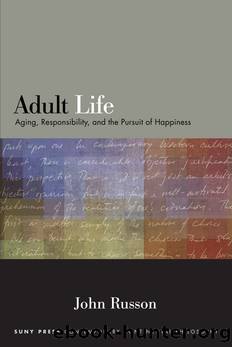Adult Life by John Russon;

Author:John Russon;
Language: eng
Format: epub
Publisher: State University of New York Press
Published: 2020-01-15T00:00:00+00:00
The Division of Labor
Economic activity is, of course, as old as human life, inasmuch as humans have always had to interact with others in appropriating aspects of the shared world to satisfy the material needs of their lives. Ibn Khaldûnâs Muqaddimah (1377), Adam Smithâs An Inquiry into the Nature and Causes of the Wealth of Nations (1776) and Karl Marxâs Capital: Critique of Political Economy (1867) study thoroughly and effectively the history of human economic practice and its role in forming the character of modern life. Perhaps the most important observation that each of these thinkers makes is that economic life is largely a collective affair, that is, it is societies that are the basic âagentsâ who grapple with the demands of economics, rather than individuals: individuals, that is, deal with their economic well-being by participating in an economic system, and that system is an integrated network of differentiated activities, shaped historically and distributed across society. We deal with our economic needs in a systematic way, and I am able to deal with my own economic needs only on the terms established for me (or others like me) by this system.
This notion that âweâ deal with âourâ economic needs is the basic sense of what Smith and Marx refer to as the âdivision of labor.â Coping with the world so as to meet the material demands of living has always been a collective affair: indeed, the very fact that we refer to âhunting and gathering societiesâ or âagricultural societiesâ points to the way in which the very form of life of a society is shaped by its collective mode of defining and addressing its economic needs. In hunting societies, such as the ancient whale-hunting society of the Thule Inuit or the more recent societies of the Plains Indians of North America, hunting and gathering are socially shared tasks producing the socially shared âwealthâ of food and materials for clothing, tools, and so on, and, corresponding to the practical demands of carrying out such a life, these societies tend to be small and family-based, and, in hunting societies at least, there is typically a division of labor between those who hunt and those who care for domestic matters, a division that typically falls along gender lines. In pastoralist (âshepherdingâ) societies such as the Maasai (Ilmaasae) of East Africa or the ancient Hebrews in which the tasks and the fruits of herding are typically shared, the life of the society is typically based upon the demands of the herd, and these societies, too, thus tend to be small and family-based. More sophisticated agricultural societies, by collectively harnessing the powers of the earth, began to develop societies in which substantial accumulation of wealth first became a meaningful possibility (a possibility that, in turn, gave rise to the possibilities of trade and, later, the industrialization and finance that define modern economies). In these societies, a settled life is both possible and required, unlike hunting and gathering or pastoral societies, which tend to be nomadic,
Download
This site does not store any files on its server. We only index and link to content provided by other sites. Please contact the content providers to delete copyright contents if any and email us, we'll remove relevant links or contents immediately.
Overcoming ADHD Without Medication : A Guidebook for Parents and Teachers by Children and Natural Psychology Association for Youth; Children The Association for Youth(753)
Out of the Mainstream: Helping the Children of Parents with a Mental Illness by Loshak Rosemary;(745)
Depression by Adams Media(705)
The Noom Mindset by Noom(518)
Delphi Collected Works of Sigmund Freud (Illustrated) by Sigmund Freud(500)
The Psychology of Media and Politics by George Comstock & Erica Scharrer(429)
MANIPULATION & MIND CONTROL: The Persuasion Collection: Dark Psychology Secrets, Analyze & Influence People with Nlp. How to learn Reading Friends and Develop Body Language Skills. by ROBERT TOWER(417)
The 48 Laws of Mental Power: Overcoming Trauma and Building Mental Strength by Victor O. Carl(380)
It's nobody's fault: new hope and help for difficult children and their parents by Harold Koplewicz(373)
Behold the Monster by Jillian Lauren(373)
Directions in Technical Writing and Communication by Gould Jay R.;(369)
The Hypnotic Coach: A Conversational Hypnotherapy Tool Kit by Marion Jess(362)
Sigmund Freud by Janet Sayers;(332)
THE PSYCHOLOGY OF ENTREPRENEURSHIP; New Perspectives by Michael M. Gielnik; Melissa S. Cardon; Michael Frese(318)
Positive Psychology Across the Lifespan; An Existential Perspective by Piers Worth(317)
Mastering Flow: Perform Better, Experience More Joy, and Live a Happier Life by Nils Salzgeber(310)
The Modern Young Man's Guide to Manhood by Wayne Walker(306)
Mind Hacking Secrets and Unlimited Memory Power: 2 Books in 1: Learn How to Improve Your Memory & Develop Fast, Clear Thinking in 2 Weeks + 42 Brain Training Techniques & Memory Improvement Exercises by Sharp Scott(306)
Secrets of the Autistic Millionaire: Everything I know about Autism, ASD, and Asperger's that I wish I'd known back then... by David William Plummer(290)
